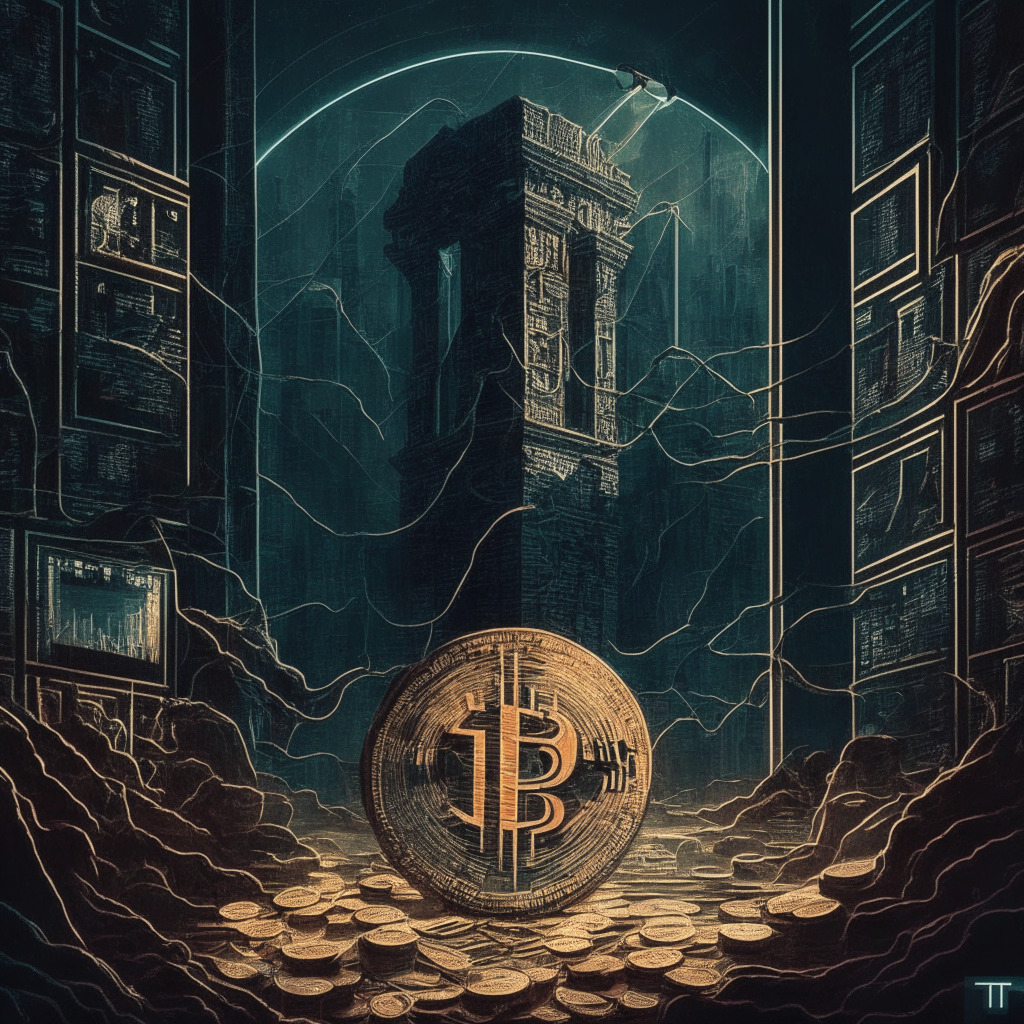The Arbitrum Foundation recently transferred unclaimed tokens worth $56 million into their network’s decentralized autonomous organization (DAO) treasury. While offering new governance possibilities, this move also carries risks and obligations for token holders, speaks volumes about the future for Arbitrum’s users, and poses questions about the speed of tokenizing and redistributing actions within just six months of their DAO launch.
Search Results for: Tether Treasury
PayPal’s Venmo and the Stalled Adoption of PYUSD Stablecoin: Analysis and Future Implications
“PayPal’s mobile payment platform, Venmo, has begun offering its Ethereum-based stablecoin, PYUSD, marking a significant step toward integrating cryptocurrency with mainstream finance. Despite its robust structure and support, PYUSD’s adoption has been slow, likely due to competition and regulatory contradictions.”
PayPal’s Entry into Stablecoin Could Disrupt Financial Markets: Quigley’s Forecast & Scrutiny
Tether co-founder William Quigley has noted that PayPal’s venture into stablecoin could revolutionize multicurrency transactions by reducing costs. However, whether PayPal will transfer these savings to end users or retain them as profit is yet to be seen.
Blending Traditional Finance with DeFi: MetaComp’s Bold Game-Changer in Singapore’s Financial Scene
“MetaComp, Singapore’s digital asset platform, combines traditional finance with decentralized finance, allowing customers to purchase traditional securities with stablecoins. Despite some skepticism due to crypto volatility, the firm believes that fiat-pegged cryptocurrencies will penetrate the real economy.”
Binance Quietly Removes Banco de Venezuela: Blockchain Freedom Versus Economic Sanctions
Cryptocurrency exchange Binance has silently removed Banco de Venezuela from its P2P service list, mirroring U.S Treasury-imposed financial sanctions. The move raises concerns among Venezuelan crypto enthusiasts, notably because the bank plays a crucial role in Venezuela’s digital currency ecosystem. Despite the silent removal, users can reportedly circumnavigate the ban due to the P2P nature of the services.
Weathering the Storm: How Exodus Survives and Thrives Amid Crypto Ebb and Flow
“Despite a bearish market, multichain wallet Exodus reported Q2 2023 revenue of $12.4 million, a modest 4% dip year-over-year. Notable was a strong fiat onboarding revenue increase, up 220% from 2022. High trade volumes came from Bitcoin, Tether and Ether. Strikingly, Exodus alleviated some financial stresses by drastically cutting administrative and marketing budgets by 65%, resulting in administrative expenses shrinking to 32.2% of revenue.”
PayPal Enters Stablecoin Market: Catalyst for Regulatory Clarity or a Step Away from Decentralization?
“PayPal’s stablecoin, PYUSD, built on the Ethereum network, signals a major step towards crypto adoption in traditional finance. Despite concerns about its centralized structure, PYUSD could clarify crypto regulations, accelerate token usage, consolidate crypto payment with traditional finance, and encourage wider adoption of blockchain technology.”
PayPal’s Venture into Crypto: Exploring Revenue Opportunities and Regulatory Challenges with PYUSD
PayPal is launching its own stablecoin, the PYUSD, targeted to become a new revenue channel for the company. Yielding interest from US dollar deposits and transaction fees, the coin aims to venture into the realms of remittances and gaming. However, potential regulatory scrutiny could impact its trajectory.
PayPal’s Stablecoin Revolution: Evolving Crypto Landscape with Regulatory Safeguards
PayPal launches its own stablecoin, PYUSD, representing a pioneering move in bringing regulatory oversight and customer asset protection to the crypto world. The coin, developed with Paxos, is closely monitored by the New York Department of Financial Services to secure it against bankruptcy risks.
Stablecoins: A Counterbalance Against De-dollarization and Boost for US Global Standing
“U.S. regulated fiat-backed stablecoins could counterbalance the weakening dominance of the dollar due to de-dollarization efforts by BRICS and emerging markets. Pegged to the U.S. dollar, these digital tokens merge traditional currency stability with cryptocurrencies’ technological strength.”
Emerging Trends: How ISIS Uses Cryptocurrency and Blockchain Technology for Funding Activities
“Affiliate groups of ISIS are increasingly utilizing cryptocurrency, specifically Tether stablecoins on the Tron network, suggests a report by TRM Labs. Regions such as Tajikistan, Indonesia, Pakistan, and Afghanistan are particularly active. This misuse of digital currencies underscores the importance of tracing blockchain donations and identifying donors to thwart pro-ISIS networks.”
Aave’s GHO Stablecoin Accomplishes $2.5 Million Minting in Two Days: An Insightful Analysis
Aave’s new stablecoin GHO, backed by the Ethereum network, generated $2.5 million within 48 hours of its launch. It operates under the governance of the Aave DAO community and offers robustness and dynamism through over-collateralized assets. With the release of GHO, Aave’s total locked value increased significantly, highlighting the platform’s success and market growth.
SEC Crackdown on DeFi and Stablecoins: Analyzing Pros, Cons, and Market Implications
The SEC is potentially targeting decentralized finance (DeFi) and stablecoins, including Tether (USDT) and USD Coin (USDC), in its enforcement crackdown, according to a Berenberg report. Stablecoins, essential to the DeFi ecosystem, have raised national security concerns due to weak sanctions and money laundering controls. The SEC aims to weaken DeFi’s capacity to rival regulated exchanges and lenders.
Crypto Community Rallies to Fund ZachXBT’s Legal Defense: A David and Goliath Story
The crypto community donated over $1 million in digital assets to fund blockchain investigator ZachXBT’s legal defense against a defamation lawsuit filed by tech entrepreneur Jeffrey Huang. Donations include contributions from well-known crypto exchange personnel, emphasizing the investigator’s crucial role in educating and maintaining transparency in the crypto community.
Atomic Wallet Hack: $35M Laundered, Regulatory Woes, and Emerging Cyber Threats
The crypto world experienced a major security breach as attackers exploited Atomic Wallet and stole $35 million in tokens. As funds move via the OFAC-sanctioned exchange Garantex, the involvement of North Korean hacking group Lazarus is suspected. This incident highlights the challenges cryptocurrencies face for security and regulatory compliance.
Circle’s New Chief Legal Officer: A Path to Compliance or Regulatory Crackdown?
Stablecoin issuer Circle appoints Heath Tarbert as chief legal officer to tackle ongoing regulatory crackdown on cryptocurrencies. Tarbert’s expertise in highly-regulated industries aims to navigate complex regulatory landscapes, balancing innovation and compliance amidst increased scrutiny in the crypto industry.
Raft’s stETH-Backed R Stablecoin: Innovation or Risky Experiment?
Raft’s new U.S. dollar stablecoin R, backed by Lido’s staked ether (stETH), introduces a unique offering in the crypto world. With a focus on avoiding inherent risks associated with fiat assets as collateral, Raft’s stablecoin aims to attract large players in the liquid staking ecosystem and withstand ongoing regulatory pressures.
Stablecoin Market Shifts: USDT Reigns Supreme as USDC Fumbles with Regulation
The market dominance of stablecoins has shifted, with Tether’s USDT hitting an all-time high and Circle’s USDC experiencing a downturn. Increased transparency is emphasized for stablecoin reserves, while Tether and Circle reduce banking exposure amid economic uncertainty and increase US Treasury holdings.
Bearish Formation, Inflation Woes, and Regulatory Risks: Will Crypto Survive the Storm?
A bearish technical formation has caused a decline in total crypto market capitalization over seven weeks, with Bitcoin, BNB, and XRP experiencing drops. Sticky inflation and weak macroeconomic data, alongside regulatory risks, contribute to uncertainty and hinder bulls from regaining control.
Ledger Wallet Recovery Debates & Exciting Developments: A Busy Week for Crypto Enthusiasts
This week in crypto, Ledger introduced a wallet recovery service, ETH staking demand soared, Tether invested in Bitcoin, and Samsung partnered with the Bank of Korea for CBDC research. Additionally, Ripple acquired Metaco, and a Uniswap survey highlighted the need for DeFi simplification.
Sanctioned Ethereum Wallet Sparks Debate: Cryptocurrency Convenience vs Illicit Activities
The U.S. Treasury’s OFAC has imposed sanctions on Russian firms and individuals, including an Ethereum wallet, for assisting Russia in evading existing punitive measures amidst the Ukrainian conflict. The case underscores the dual nature of cryptocurrencies as convenient cross-border transaction tools and potential means for illicit activities, emphasizing the need for balancing their benefits with security safeguards.
Stablecoin Dilemma: Market Contraction Threatens Crypto Recovery and US Debt Ceiling Issue
The stablecoin universe’s ongoing contraction, impacted by U.S. regulatory crackdowns and other challenges, hinders hopes of a sustained crypto market recovery, says a JPMorgan research report. Stablecoins’ struggles pose far-reaching consequences for the entire crypto ecosystem, and overcoming these obstacles is crucial for long-term growth and security.
Stablecoin Issuers Adapt Strategies Amid US Debt Ceiling Crisis: Different Approaches Compared
Stablecoin issuer Circle has revised its reserve treasury strategy to mitigate potential risks from a US debt default, converting to short-dated U.S. Treasuries. As stakeholders in the blockchain industry adjust strategies, Circle aims to insulate itself from risks associated with a possible U.S. debt crisis.






















